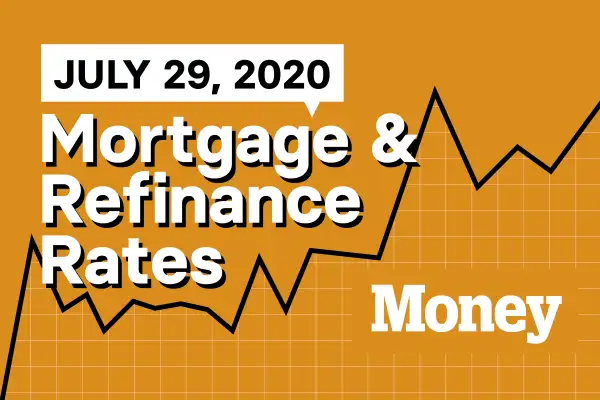Here Are Today's Best Mortgage & Refinance Rates for July 29, 2020

Despite near record low interest rates, the total number of mortgage loan applications ticked down last week as the COVID-19 resurgence started to wear on home buyers.
The overall number of loan applications decreased by less than 1% for the week ending July 24, according to the Mortgage Bankers Association. Purchase applications dipped 1% while refinance loan applications slipped 0.4% from the previous week. Still, purchases and refinanced applications were respectively up 21% and 122% compared to a year ago. Refis represented 65% of all mortgage loan activity.
According to the survey, the decline was sharpest among FHA, VA and USDA loans. "This trend, along with the fact that average loan sizes are increasing, indicate that prospective first-time buyers are being impacted more by the rising economic stress caused by the resurgence in COVID-19 cases, as well as the uncertainty on how the next round of government support will take shape," said Mike Fratantoni, MBA's chief economist.
As legislators in the Senate debate another coronavirus relief package, policy makers at the Federal Reserve are taking action. In response to the continued economic toll of the virus, the Fed announced Tuesday that it's extending its emergency lending programs through the end of 2020. These lending programs serve two purposes—to supply short term markets with loans and to support a number of different credit markets. After the conclusion of a two-day policy meeting Wednesday, Fed Chair Jerome Powell will host a press conference to talk about potential next steps, though no further action is expected this week.
What are people paying for mortgages right now?
Borrowers with 700 credit scores were charged an average of 3.675% to secure a 30-year fixed-rate purchase mortgage on Monday, according to Money's survey of over 8,000 mortgage lenders across the country. The average rate for a 30-year refinance was 4.427%.
What are experts saying about home prices?
Frank Nothaft, chief economist for property analytics provider Core Logic, spoke with Money recently:
“The record-low level of fixed-rate mortgage rates is good news for all home buyers, and particularly for first-time home buyers, many of whom have been renting in multifamily buildings and want to move to a single-family home during the pandemic.”
For more expert insight into mortgage rates, read: How Low Are Mortgage Rates Right Now? Just Look at the Sky High Numbers From the 80's and 90's
What else should house hunters be watching this week?
On Thursday, Freddie Mac will release it's weekly Primary Mortgage Market Survey, detailing the average interest rates for the past week. Other information to look out for on Thursday includes the weekly new unemployment claims data, which could indicate whether recent job gains have been affected by the resurgence of COVID-19, as well as data on the U.S. gross domestic product for the second quarter, which will likely reflect steep losses caused by the pandemic lockdowns in April and the slow re-openings of May and June.
What are today’s advertised rates?
Of course, mortgage rates vary widely by location and personal factors like location, the size of your down payment and your credit score. Here are today’s advertised mortgage rates at some of the mortgage industry’s largest lenders. (All rates are APRs. The rates you see may be different.)
JP Morgan Chase
Based in New York, JP Morgan Chase has nearly 5,000 U.S. branches.
Mortgage rates advertised for July 29:
30-year fixed: 2.951%
15-year-fixed: 2.530%
5-year ARM: 2.694%
(Rates based on New York City zip code 10006.)
Wells Fargo
Based in San Francisco, Wells Fargo has more than 7,000 locations.
Mortgage rates advertised for July 29:
30-year fixed: 3.113%
15-year-fixed: 2.848%
5-year ARM: 2.851%
Quicken
Quicken, a non-bank lender based in Detroit, is the nation’s largest mortgage lender by dollar origination volume.
Mortgage rates advertised for July 29:
30-year fixed: 3.139%
15-year-fixed: 2.924%
(Quicken doesn’t advertise a five-year adjustable rate.)
Bottom Line:
Everything You Need to Know About Mortgage Rates in 2020
How Long Will Home Prices Continue to Rise? 8 Experts Weigh In
Don't Have 20% for a Down Payment? Here's How to Buy a Home With Less
